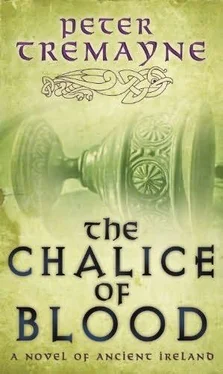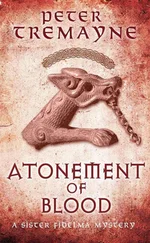Peter Tremayne - Chalice of Blood
Здесь есть возможность читать онлайн «Peter Tremayne - Chalice of Blood» весь текст электронной книги совершенно бесплатно (целиком полную версию без сокращений). В некоторых случаях можно слушать аудио, скачать через торрент в формате fb2 и присутствует краткое содержание. Жанр: Исторический детектив, на английском языке. Описание произведения, (предисловие) а так же отзывы посетителей доступны на портале библиотеки ЛибКат.
- Название:Chalice of Blood
- Автор:
- Жанр:
- Год:неизвестен
- ISBN:нет данных
- Рейтинг книги:5 / 5. Голосов: 1
-
Избранное:Добавить в избранное
- Отзывы:
-
Ваша оценка:
- 100
- 1
- 2
- 3
- 4
- 5
Chalice of Blood: краткое содержание, описание и аннотация
Предлагаем к чтению аннотацию, описание, краткое содержание или предисловие (зависит от того, что написал сам автор книги «Chalice of Blood»). Если вы не нашли необходимую информацию о книге — напишите в комментариях, мы постараемся отыскать её.
Chalice of Blood — читать онлайн бесплатно полную книгу (весь текст) целиком
Ниже представлен текст книги, разбитый по страницам. Система сохранения места последней прочитанной страницы, позволяет с удобством читать онлайн бесплатно книгу «Chalice of Blood», без необходимости каждый раз заново искать на чём Вы остановились. Поставьте закладку, и сможете в любой момент перейти на страницу, на которой закончили чтение.
Интервал:
Закладка:
At the entrance to the building they watched Brother Lugna hurry off across the quadrangle. Then Fidelma caught Eadulf by the arm.
‘Before we find the smith, there is something else I wish to see.’
Puzzled, he followed her along the gap between the side of the building and the old wooden wall that surrounded the abbey. She halted at the back of the building, looking up at the windows. Fidelma paused when she judged them to be underneath the window of Brother Donnchad’s chamber three storeys up.
‘Careful,’ she said to Eadulf and stood still. Fidelma examined the ground carefully. Then she shook her head. ‘I can see no sign where anyone might have placed a ladder, nor can I see any other means of reaching the window above.’
‘Well, you were sure that the window was not a means of ingress anyway,’ Eadulf said.
‘These things have to be checked and checked again,’ returnedFidelma. As she turned her eye caught a scrap of white almost buried in the mud. ‘What’s that?’
Eadulf was nearer to it and bent down, carefully extracting it from the mud. He wiped some of the clinging earth from it. Then he held up a tiny piece of torn parchment in his hand. It was crumpled as if it had been discarded.
‘It’s nothing,’ he said, looking at it. ‘It must have been out here for some time and it is damp.’
‘Be careful with it,’ she said. ‘There is still some writing on it.’
He gently stretched it out so that the few words were readable although the ink had started to run.
‘Anything of interest?’ asked Fidelma.
Eadulf shook his head. ‘I think this is a line from one of the gospels — si vis transfer calicem istrum a me . It is followed by three words, the same word written three times over — Deicide! Deicide! Deicide! There is nothing else on it.’
‘The last word means “god-killer” in Latin.’ Fidelma peered at the text over his shoulder. ‘To Dei , the word for god, is added cide from the verb caedere to cut down.’
‘Why would anyone write that out several times? Was someone trying to remember how to spell it? Maybe it was Brother Donnchad and having captured the word he threw the parchment out of the window.’
‘A scholar of Brother Donnchad’s ability could surely spell a simple Latin word.’
‘God-killer is what some of the early Christian Fathers claimed the Jews were because they demanded the crucifixion of Christ,’ Eadulf said. ‘But where does that first line come from? Something about “remove this chalice from me”.’
‘Chalice or cup. It depends on your translation,’ replied Fidelma. ‘I think it is from the gospel of Luke.’
She frowned, took the parchment from him and examined itagain before placing it in her ciorbholg , which she always carried attached to her criss , or belt. The ciorbholg , or comb-bag, was carried by all women and usually contained items such as a scathán , a mirror, deimess , scissors, sleic , soap, a phal containing a favourite fragrance — Fidelma preferred honeysuckle — a small linen cloth and other personal items.
Eadulf was impatient. ‘Let us find the smith and see what he can tell us about the lock and maybe a second key.’
Usually, they could locate a forge by the sound of the hammer smashing down on the inneoin , or anvil, but with the sound of the building work it was impossible. Before they came to the forge they passed another tall building being erected with stone blocks and suddenly Eadulf nudged Fidelma.
‘There is a means of entrance to Brother Donnchad’s cubiculum and someone small enough to pass through the window.’
A tall ladder was resting against the building to allow the masons to climb to the upper walls. Seated by it was a small boy who was busy sharpening a chisel with a honing stone.
Fidelma regarded the boy critically for a moment. ‘I’ll grant he’s probably small enough but he would need two conspirators to help lift the ladder in place.’ So saying, she strode across to the boy.
‘Hello,’ she greeted him. ‘I haven’t seen you before.’
The boy was no more than ten years old, with fair hair, a ruddy face and wiry limbs. He glanced up at her with a shy smile.
‘Nor I you, Sister,’ he replied pertly.
‘My name is Fidelma and he,’ indicating Eadulf, ‘is called Eadulf. What’s your name?’
‘Gúasach. Why does he have a funny name?’
Fidelma chuckled. ‘Because he comes from a place across the sea which is called the Kingdom of the East Angles. Are you working on this building?’
The boy smiled proudly. ‘I am. I am apprentice to the master builder.’
‘How long have you-’
Her question was interrupted by a loud shout from a rough-voiced man on the other side of the new wall.
‘Gúasach! The chisel immediately!’
The boy sprang up with the chisel, gave them a grin of apology and disappeared through a gap in the wall.
Fidelma turned to Eadulf. ‘I doubt we have found the killer in that lad.’
‘Conspiracy?’ mused Eadulf. ‘Several people carried the ladder to the wall, the boy went up, killed Brother Donnchad and took the papers and books they wanted …’ Eadulf halted with a wry chuckle. ‘You are right. It is not a likely story.’
The cérdcha , or forge, of Brother Giolla-na-Naomh was located near the main gate of the community but just beyond the stables. It was after several wrong turns that they finally found the way behind the stable block. A young man stripped to the waist was gripping a glowing piece of metal in a tenn-chair , a pair of tongs. He struck the metal with an ord , a heavy hammer, causing sparks to fly as each ringing blow descended. An older man, also bare to the waist, though with a buckskin apron covering his chest and front, was clearly overseeing the young man’s work. He caught sight of their approach and said something to his apprentice. The young man turned from the anvil and plunged the piece of metal he was working into a telchuma , or water trough, next to the anvil.
‘Greetings, Sister Fidelma,’ the older man boomed. His voice was as deep and resonant as one might expect from his tall and muscular appearance. ‘I saw you and Brother Eadulf in the refectorium last evening. I am Brother Giolla-na-Naomh.’
Both Fidelma and Eadulf recognised the smith as one of those who had been seated at the abbot’s table the previousnight. A smith of the rank that had been ascribed to Brother Giolla-na-Naomh would of course, take precedent among the hierarchy of the abbey after the abbot, his steward and librarian.
The big man smiled through his shaggy black beard and examined them keenly with his blue eyes. He thrust out a massive hand to each of them in turn.
‘While I am pleased to welcome you here,’ he said, ‘it is sad that it is the death of Brother Donnchad that brings you.’
‘We share your sadness, Brother Giolla-na-Naomh,’ replied Fidelma solemnly, ‘and appreciate your welcome.’
The smith turned to his apprentice. ‘Bring me the metal lock that is on the shelf behind you.’ When the young man had passed it over, the smith added more instructions. ‘Stoke up the furnace with the cual craing and keep it hot.’ Eadulf knew that cual craing was literally ‘coal of wood’, the term applied to charcoal.
The smith turned back to them and pointed to a stone bench that stood under the canopy of a yew tree a little way from the forge.
‘The furnace is too hot to remain in comfort near it on a day like this,’ he said. ‘We may sit in the cool shade of that tree. The bench is comfortable. Brother Lugna advised me last evening that you would be wishing to question me.’
Читать дальшеИнтервал:
Закладка:
Похожие книги на «Chalice of Blood»
Представляем Вашему вниманию похожие книги на «Chalice of Blood» списком для выбора. Мы отобрали схожую по названию и смыслу литературу в надежде предоставить читателям больше вариантов отыскать новые, интересные, ещё непрочитанные произведения.
Обсуждение, отзывы о книге «Chalice of Blood» и просто собственные мнения читателей. Оставьте ваши комментарии, напишите, что Вы думаете о произведении, его смысле или главных героях. Укажите что конкретно понравилось, а что нет, и почему Вы так считаете.











